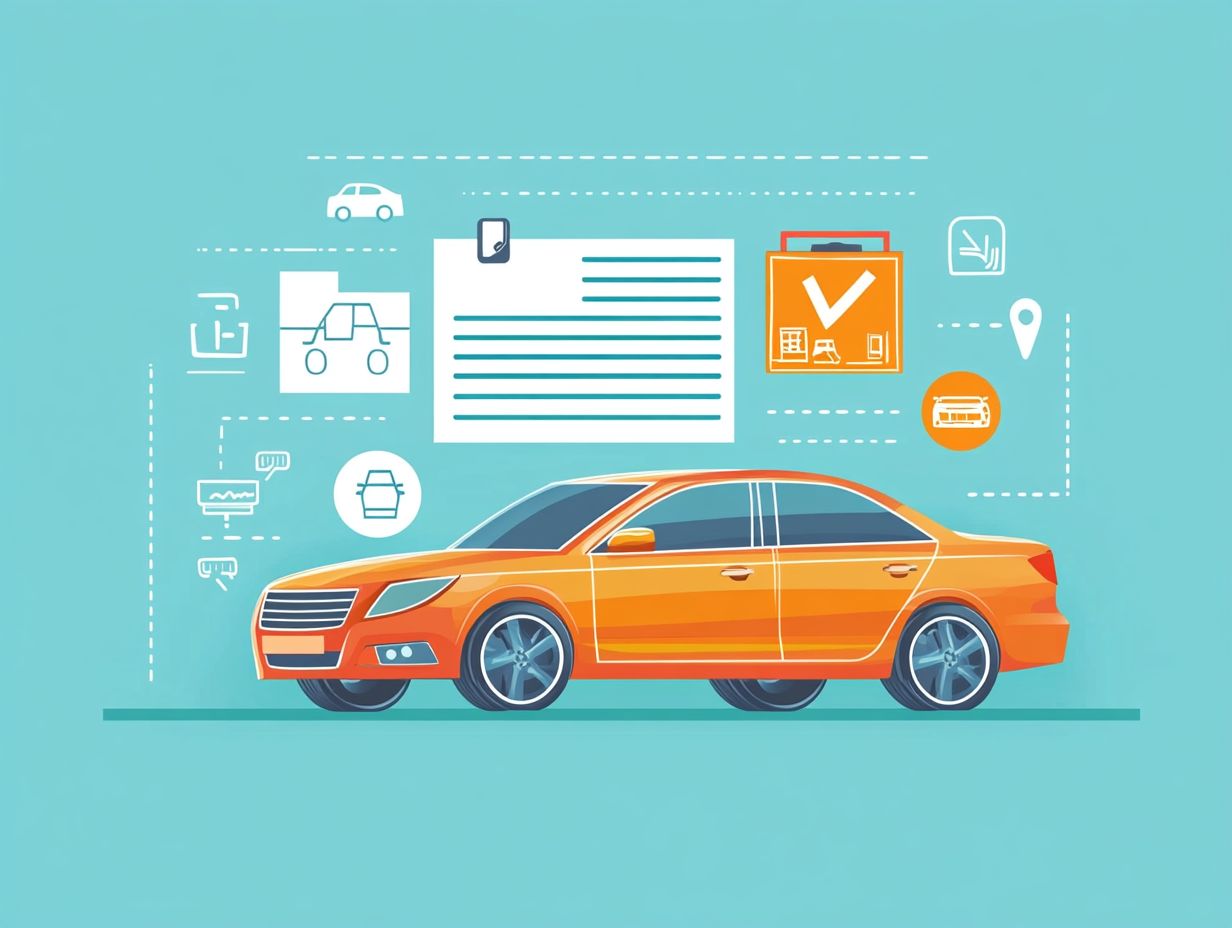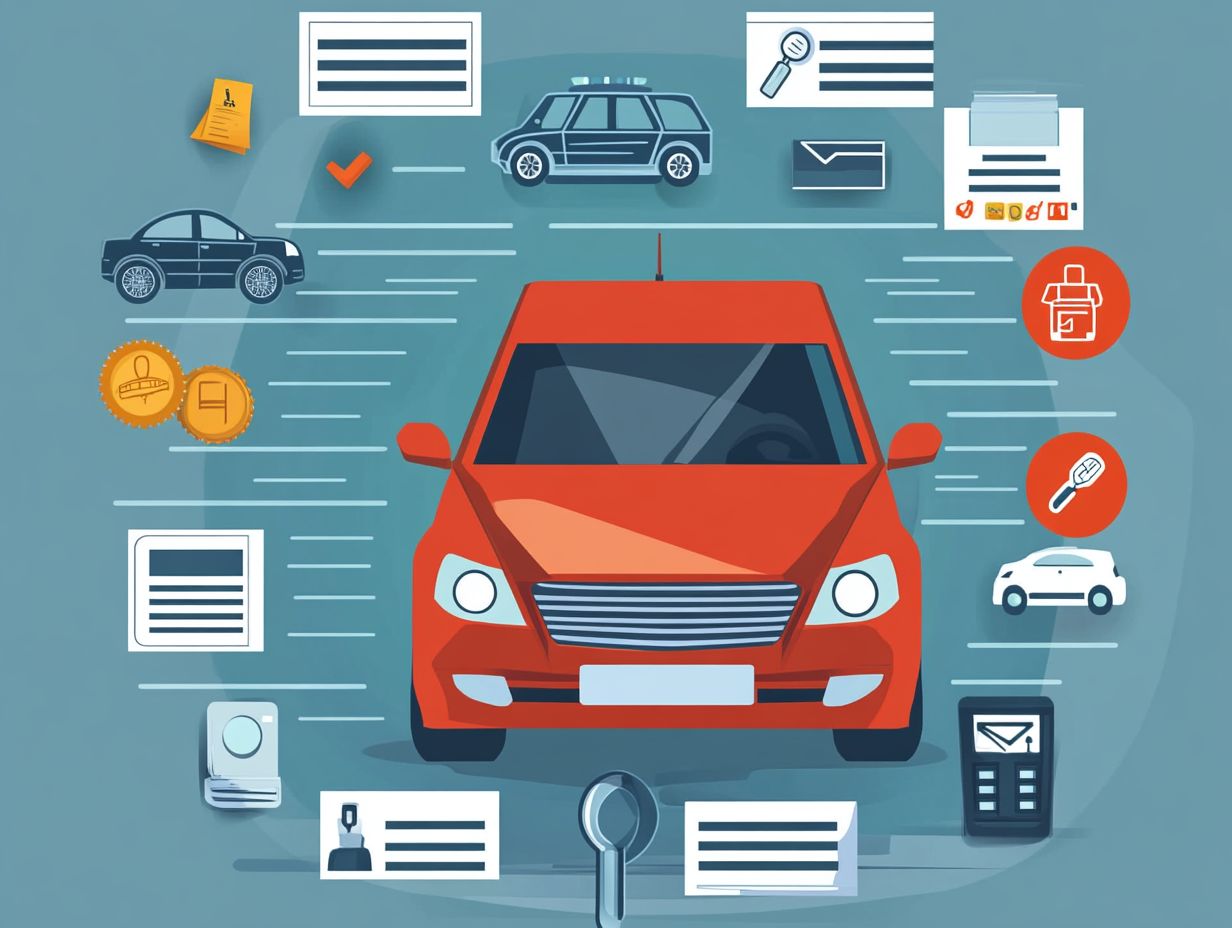Car Negotiation Cheat Sheet: Quick Tips
Purchasing a car can evoke a mix of excitement and overwhelm, particularly when it comes to negotiating the best deal.
With numerous factors to weigh ranging from budgeting to comprehending the vehicle’s true value it’s essential for you to navigate this process with both confidence and knowledge.
This guide provides you with quick, actionable tips designed to empower you during negotiations, enabling you to secure a reliable vehicle at a fair price.
Whether you’re in the market for a new or used car, these strategies will position you for success.
Contents
- Key Takeaways:
- 1. Do Your Research
- 2. Know Your Budget and Stick to It
- 3. Get Pre-Approved for Financing
- 4. Don’t Be Afraid to Negotiate
- 5. Know the Value of the Car
- 6. Look for Incentives and Rebates
- 7. Consider the Total Cost of Ownership
- 8. Be Prepared to Walk Away
- 9. Don’t Fall for Pressure Tactics
- 10. Get Everything in Writing
- 11. Check for Hidden Fees
- 12. Test Drive the Car
- 13. Inspect the Car’s Condition
- 14. Consider Buying Used
- 15. Don’t Rush the Process
- Frequently Asked Questions
- Q1: What is a car negotiation cheat sheet?
- Q2: Why do I need a car negotiation cheat sheet?
- Q3: What information should be included in a car negotiation cheat sheet?
- Q4: How do I use a car negotiation cheat sheet?
- Q5: Can I negotiate the price of a car even if it is already on sale?
- Q6: Is it possible to negotiate a lower interest rate on a car loan?
Key Takeaways:

Do your research to know the value of the car and its features before negotiation. Stick to your budget and get pre-approved for financing to avoid overspending. For the best results, consider using winning techniques for online car negotiation. Feel empowered to negotiate! You can walk away if the deal isn’t right for you.
1. Do Your Research
When you embark on the journey of purchasing a car, doing your homework is essential. It ensures you are well-equipped with knowledge about various aspects, including market prices and the details about loans and payments.
These factors can significantly influence your overall experience and the outcome of your purchase. By utilizing reputable resources like Kelley Blue Book and Edmunds.com, you can gain invaluable insights into vehicle history and market comparisons.
These platforms offer critical data that helps you understand what similar cars are selling for in your area, enabling you to determine whether a dealership’s quote is fair. Evaluating financing terms carefully is just as important; researching interest rates and payment structures can lead to meaningful savings in the long run.
It’s wise to approach multiple lenders, comparing offers to secure the best financing rate that suits your budget. This strategy ultimately makes your car-buying experience smoother and far more rewarding.
2. Know Your Budget and Stick to It
Establishing a clear budget is crucial in your car buying process. It acts as your compass, guiding you to determine what monthly payment fits your financial comfort zone while keeping you from overspending on a vehicle that may strain your finances.
To effectively calculate a realistic budget, evaluate your total income and expenses. Make sure to include a buffer for those unexpected costs that life inevitably presents.
Estimating your monthly payments means understanding the terms of the loan, including the interest rates, which can dramatically impact your total costs over time. Using online calculators or consulting with a financial expert can help you gauge possible payment amounts based on various loan scenarios.
Get pre-approved for financing; it s a game changer. It empowers you with a clearer understanding of your financial limits, allowing for informed decisions and strengthening your negotiation position with sellers.
3. Get Pre-Approved for Financing
Get pre-approved for financing to streamline your car buying journey. This step gives you the power to compare financing terms from various lenders, enabling you to secure the most advantageous interest rates before stepping foot in the dealership.
To kick things off, gather essential documents like proof of income, tax returns, and identification. It s vital to grasp the impact of your credit score, as it significantly influences the terms of your financing after all, higher scores often lead to better rates.
With a solid understanding of your budget, you can enter negotiations with confidence. Having a pre-approved amount equips you to make informed decisions and leverage your financing effectively, allowing you to negotiate a better deal on the vehicle itself.
Start your car buying journey today with these tips, and drive home the deal of your dreams!
4. Don’t Be Afraid to Negotiate

Negotiating with a car dealer may seem scary, but don t let that stop you! It s your chance to save big!
Negotiating with a car dealer may feel daunting, but it’s an essential skill that can lead to impressive savings. By employing effective negotiation tactics and familiarizing yourself with the dealer invoice, you can learn best practices for car negotiation to secure the best possible deal on both new and used vehicles.
As a savvy buyer, you’ll want to do your homework. Research pricing on platforms like Kelley Blue Book or Edmunds.com; they provide invaluable market data to inform your negotiation strategy and equip you with essential negotiation skills for car buyers.
Understanding the dealer’s costs gives you the upper hand, enabling you to engage in discussions from a solid foundation. Approach the negotiation process with confidence, maintaining a calm demeanor and clear goals.
This mindset not only enhances your communication skills but also signals to the dealer that you’re well-prepared. By utilizing these strategies, you significantly increase your chances of walking away with a favorable outcome.
5. Know the Value of the Car
Understanding the true value of the car you re interested in is essential. This knowledge enables you to make informed decisions, such as checking how much your old car is worth or comparing prices across platforms like Kelley Blue Book and AutoTrader.
By leveraging tools such as Kelley Blue Book and Edmunds.com, you can easily assess vehicle values based on make, model, year, and condition. These platforms offer comprehensive pricing information that mirrors current market trends, helping you negotiate better deals.
Obtaining a vehicle history report from reputable sources like Carfax or AutoCheck is also crucial. These reports reveal insights into a vehicle’s past, including any accidents, service records, and title issues.
Armed with this information, you can avoid overpaying for a car that might harbor hidden problems, ensuring that your investment is sound and your purchase is a wise one.
6. Look for Incentives and Rebates
Many car dealers present a range of enticing incentives that can elevate your buying experience. These offers effectively lower your overall cost and help you secure more favorable financing terms on your new or used vehicle.
These incentives manifest in various ways, including manufacturer offers that might reduce the purchase price or provide attractive low-interest financing options. You may find dealer-specific discounts tailored to local market conditions, leading to significant savings for the discerning buyer.
By proactively inquiring about these opportunities during your negotiations, you ensure that no potential benefits slip through your fingers. Grasp these financial tools to not only make your purchase more affordable but also experience the thrill of a smarter buying journey!
7. Consider the Total Cost of Ownership
Before you buy a car, think about the total cost of ownership. It s more than just the monthly payment!
This means looking beyond just the monthly payment to include insurance, fuel, maintenance, and any potential extended warranty or GAP coverage you might need. (GAP coverage helps protect you if your car is stolen or totaled, covering the difference between what you owe and what your car is worth.)
By dissecting each component, you ll gain a clearer understanding of the financial implications over time. For example, insurance premiums can vary significantly between a new car and a used one, while fuel efficiency emerges as a vital factor impacting your monthly expenses.
Don t forget to factor in regular maintenance costs, as older vehicles tend to require more repairs. By grasping these details and leveraging online calculators for accurate cost projections, you can make more informed decisions.
This careful method helps you compare models easily while ensuring you stay aligned with your personal budget, ultimately steering you toward the most suitable option be it a brand-new vehicle or a beloved pre-owned treasure. Happy car shopping!
8. Be Prepared to Walk Away

Being ready to walk away from a deal can be an effective negotiation tactic. It shows the dealer that you’re not desperate and are willing to stand your ground.
This assertiveness can make dealers clearly aware that they might lose a potential customer. It may prompt them to rethink their initial offer.
Imagine this: you face pushback on the price, decide to leave, and receive a call with a better deal shortly after. This tactic works for real estate too.
When you stand firm, sellers may feel motivated to adjust their terms to attract buyers like you. Keep your composure and patience, as this creates an environment for better negotiations.
9. Don’t Fall for Pressure Tactics
Stay vigilant during the car buying process. Some dealerships use pressure tactics to rush you into hasty decisions that aren’t in your best interest.
Recognizing these tactics helps you navigate the experience with clarity. Common strategies include:
- Limited-time offers creating a false sense of urgency
- Aggressive upselling of extras
- Fostering competition among potential buyers
By understanding these methods, you can take a step back and evaluate your needs. Remember, taking time to weigh your options leads to a satisfying purchase that fits your budget.
10. Get Everything in Writing
Documenting all agreements, dealership quotes, and financing terms is essential for your protection. Written documentation clarifies expectations and responsibilities for everyone involved.
When creating these records, include specific details like discussion dates, names of individuals present, and descriptions of the vehicle and terms. Don’t forget to note interest rates, loan amounts, and payment schedules.
Make sure to document any contingencies or promises made during negotiations. This information can be invaluable if disputes arise later.
By maintaining an organized file, you enhance accountability and transparency, paving the way for a smoother car buying experience.
11. Check for Hidden Fees
Examine the dealer invoice closely for hidden fees that may inflate your total purchase price. This scrutiny helps maintain transparency and prevents unpleasant surprises.
Common hidden fees, like dealer preparation fees, can add hundreds of dollars without clear justification. Documentation fees vary widely among dealers and might include services you expect to be part of the sale.
Charges like advertising fees can sneak in too. Be sure to ask about each line item to avoid surprises.
By clarifying any ambiguous charges, you boost your confidence during negotiations and improve your overall purchasing experience.
12. Test Drive the Car

A comprehensive test drive is essential. It allows you to evaluate the car s performance, comfort, and features.
Try driving in different conditions. Busy streets, smooth highways, and winding roads provide insights into how the vehicle performs.
Pay attention to responsiveness, noise levels, and comfort during your drive. This information is vital for making a choice.
Inspect the vehicle’s condition before and during the test drive. Look for unusual sounds, vibrations, or warning lights.
Being observant helps you make informed decisions and avoid future issues.
13. Inspect the Car’s Condition
Inspecting the car is essential for both new and used vehicles. This ensures you re making a wise investment.
Check both the exterior and interior closely. Look for scratches, dents, or signs of rust.
Inside, examine the upholstery for wear and ensure features like air conditioning and lights work properly.
Review mechanical components, such as the engine and brakes, to assess reliability. Also, check the vehicle history report for past accidents or maintenance records.
14. Consider Buying Used
Buying a used vehicle can save you money. It often means lower purchase prices and better trade-in values.
You avoid significant depreciation losses. New cars can lose up to 20% of their value in the first year.
Lower insurance premiums make owning a used car more affordable. This allows for budget-friendly monthly expenses.
To find a quality used vehicle, you should:
- Review the vehicle history report.
- Choose well-maintained models with good reviews.
- Consider hiring a mechanic for an inspection.
These steps can help you find a reliable vehicle that fits your budget and offers lasting value.
Don’t miss your chance to find a great deal!
15. Don’t Rush the Process
Rushing through the car-buying process can lead to decisions you might later regret. Take your time to explore! Look at your choices closely, negotiate with confidence, and fully understand the details about how you’ll pay for the car before making any commitments.
By approaching this journey with patience, you ll find the vehicle that perfectly suits your needs. You ll also ensure you re making a sound financial investment.
Staying organized is important; creating a checklist can help you keep track of crucial details like your budget, preferred features, and dealer information.
Set specific goals for each step of the process to maintain focus. Gather research from various sources and allow yourself plenty of time for test drives. This will help refine your choices, leading to a thoughtful decision that aligns with your long-term aspirations.
Frequently Asked Questions
Q1: What is a car negotiation cheat sheet?
A car negotiation cheat sheet is a quick reference guide that provides negotiation tips for used car buyers to help you secure the best deal when purchasing a car.
Q2: Why do I need a car negotiation cheat sheet?
A2: Having a car negotiation cheat sheet handy can help you feel more confident and prepared when negotiating with a car dealer. For more insights, check out this guide on how to prepare for a car negotiation. It can also help you save money by providing you with valuable tips and advice.
Q3: What information should be included in a car negotiation cheat sheet?
A car negotiation cheat sheet should include information on how to research car prices, negotiate trade-ins, financing options, and mastering car price negotiation techniques for getting the best deal.
Q4: How do I use a car negotiation cheat sheet?
A4: Before heading to the dealership, review the cheat sheet and familiarize yourself with negotiation tips for luxury car buyers. Use the information to guide your negotiations and remember to stay calm and confident during the process.
Q5: Can I negotiate the price of a car even if it is already on sale?
A5: Yes, you can still negotiate the price of a car even if it is already on sale. Use your research and the tips from the negotiating car prices: do’s and don’ts to negotiate for an even better deal.
Q6: Is it possible to negotiate a lower interest rate on a car loan?
A6: Yes, it is possible to negotiate a lower interest rate on a car loan. Use the tips and advice from the car negotiation cheat sheet to help you negotiate a lower rate with the dealership or your own bank.
Ready to start your car-buying journey? Download our negotiation cheat sheet now!






